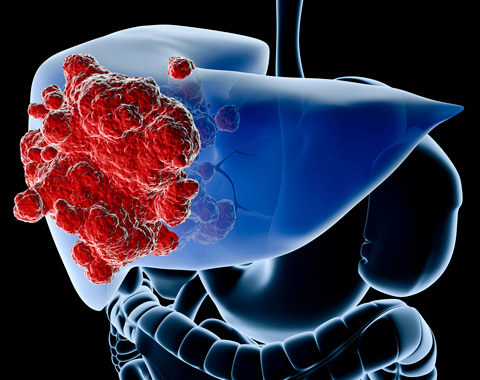Vitamin K2: Help for Liver Cancer

Chronic liver diseases (e.g., hepatitis C) and liver injury from chronic alcohol abuse or NAFLD are linked to the development of liver cancer. Diabetes also increases the risk of liver cancer by almost double. Can vitamin K and vitamin K2 help?(34, 39, 72, 76-77)
Clinical Evidence of Benefit
Several clinical trials suggest vitamin K2 may help prevent or treat liver cancer:
Lower the Risk of Recurrence with Vitamin K2
One of the reasons HCC, a common form of liver cancer, is so aggressive is because it involves lots of blood vessels that feed tumor growth. On-going research for methods to block the development of new blood vessels is therefore important in treating this type of liver cancer.(76-77)
In one 36-48 month clinical study, 87 patients were given 45 mg/day of vitamin K2 in combination with an ACE-I inhibitor to determine the preventive benefit against HCC tumors. Neither the vitamin nor the drug demonstrated any effect on tumor recurrence when used alone.(39)
However, the combination treatment appeared to reduce the recurrence of HCC. This benefit was likely due to slowing blood vessel growth. The ACE inhibitor and vitamin K2 lowered levels of vascular endothelial growth factor (VEGF) — a protein that promotes blood vessel growth.(39)
Prevent Development of HCC in People with Hepatitis C and Hepatitis B
Vitamin K2 does not seem to have any impact by itself in preventing tumor recurrence in patients already diagnosed with HCC. However, results of a randomized, controlled clinical trial suggest that vitamin K2 may prevent HCC from developing from viral cirrhosis of the liver.(72)
Forty female patients with viral liver cirrhosis were randomly divided into treatment and control groups. The treatment group received 45 mg/day of vitamin K2.(72)
Both groups were followed over a 2-year period to assess for development of HCC. The results were promising: only two of the 21 treated patients developed HCC, compared to nine of the 19 women in the control group.(72)
Block Metastasis and Improve Survival Rate
Another frequent complication with HCC is portal vein invasion (PVI). Results of a randomized clinical trial suggest that vitamin K2 may be a powerful ally to help prevent metastasis in HCC patients.(40)
In this two year study conducted between 1999 and 2001, 120 patients with HCC with PVI were randomly divided into two equal-sized groups. One group was given 45 mg/day of vitamin K2. The group who took the vitamin K2 regimen had dramatically lower rates of PVI recurrence:(40)
- 2% recurrence rate in treated group vs. 21% in untreated control group for the first year
- 13% in treated group vs. 55% in the untreated control group for the second year
The vitamin K2-treated group also had significantly improved survival rates. In fact, 59% of these patients still alive after two years (compared to 29% of the control group).(40)
Can Vitamin K Help Prevent Liver Cancer Too?
Diabetic patients have twice the risk of developing HCC than non-diabetics. Population studies show a link between higher levels of vitamin K in the diet and lower levels of insulin resistance. This suggests that vitamin K might help lower the risk of diabetes.(34, 76-77)
A 3-year clinical trial further corroborated the benefits of vitamin K supplements on reducing the risk of diabetes. Participants were given 500 μg/day of vitamin K1.(34)
Results showed that vitamin K significantly slowed the progression of insulin resistance - but only for men. However, researchers suggest that the higher rate of obesity of women in the study may have had an effect.(34)
Lab studies suggest that vitamin K may help improve the effectiveness of chemotherapy. When combined with sorafenib, results showed that vitamin K significantly blocked proteins that promote liver cancer.(78)



